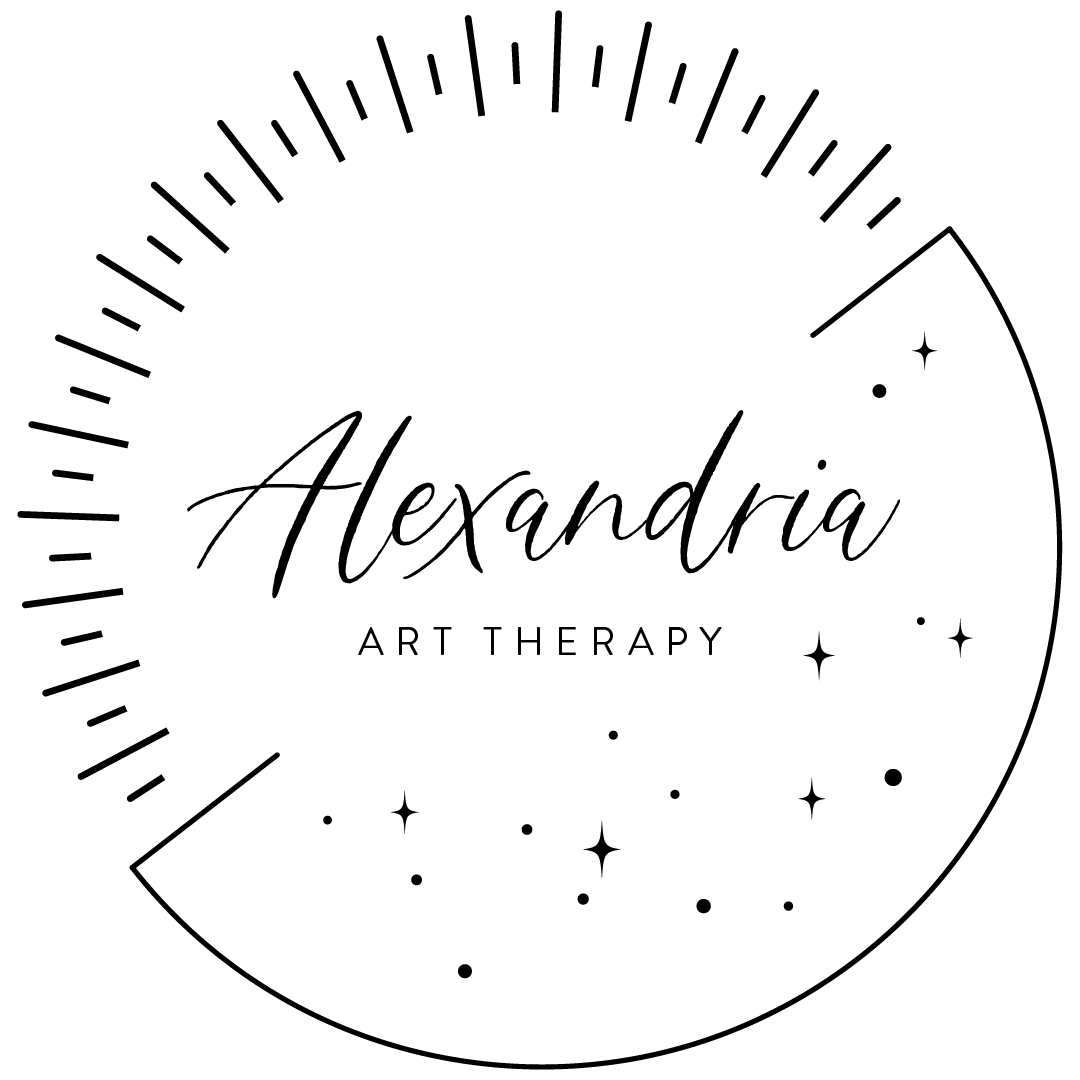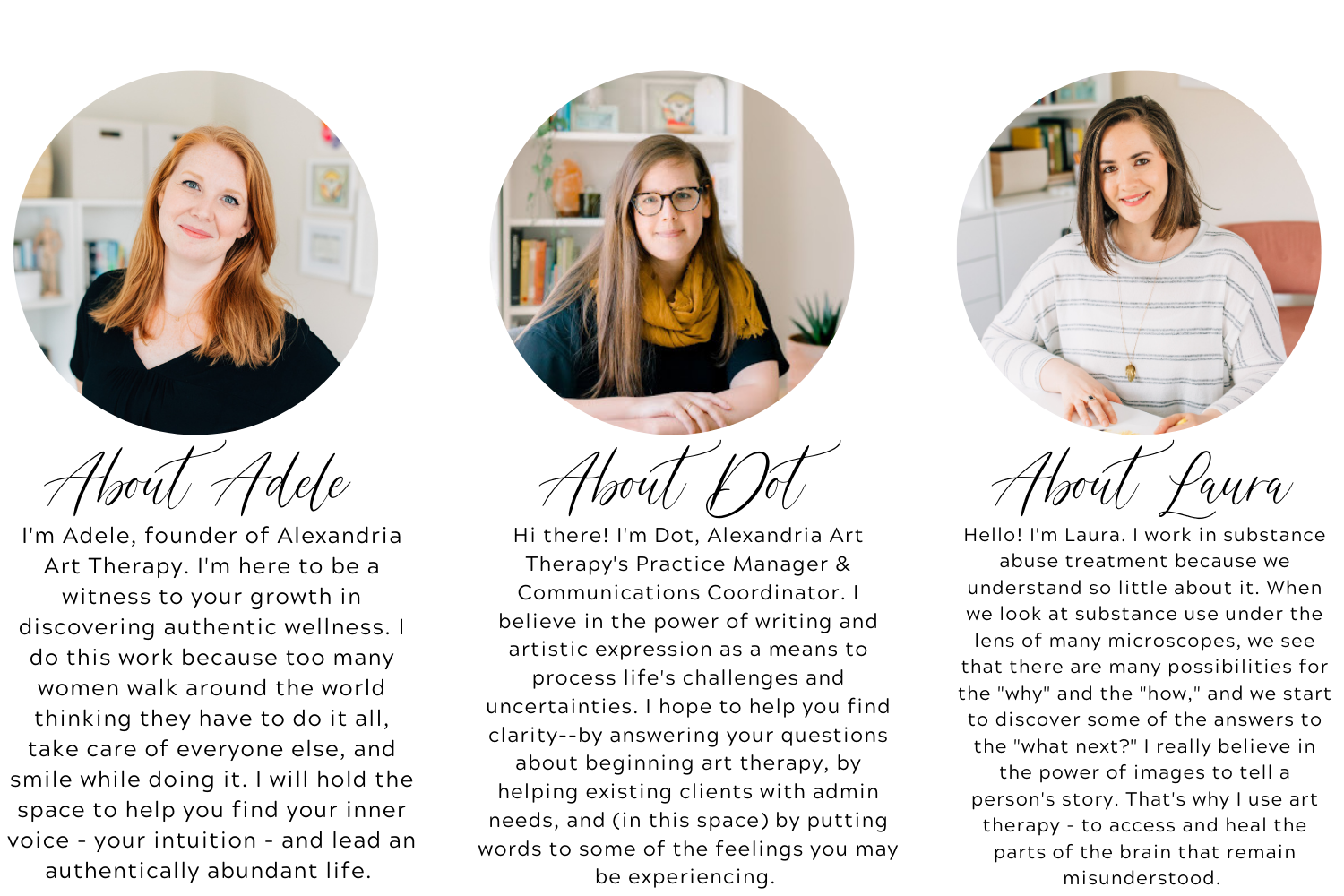Ask a Therapist: How Do I Manage My Pandemic Anxiety as I Start to Venture Out?
I’m vaccinated...but is it REALLY safe?
I don’t know how to ask my friends to hang out anymore.
I’m so tired that I don’t have the energy to change my way of living.
I know I would feel good socializing, but it feels so exhausting.
I don’t even know what to talk about anymore.
How am I supposed to re-engage in a world that I have essentially shut out?
As more of my friends and family are vaccinated and the weather is warming up, I’m noticing I’m having a lot of conversations about anxiety. Anxiety walking into a busy store, even though you’re vaccinated and wearing a mask. Anxiety about seeing people because you don’t remember how to have a conversation anymore. Anxiety to re-enter the world.
So I asked the therapists: how do we manage this anxiety as we start to venture out?
ACKNOWLEDGE WHY THIS IS HAPPENING
Alexandria Art Therapy clinical director and art therapist Adele Stuckey says, “After spending a year in various stages of lockdown, the idea of engaging in activities and tasks that used to be common in daily life can now actually feel terrifying. You may have spent months living in a state of fear. Your nervous system is tired from day after day, month after month, of operating in protection mode--stay away from people, limit activities outside of the house, be in a state of vigilance, don’t let your guard down. So after practicing this way of living for over a year, imagining a different ‘normal’ may not only feel uncomfortable, but can actually feel terrifying.”
It’s tempting to beat yourself up for being anxious at things you used to do all the time. Why am I breaking into a cold sweat in a store? Why am I nervous to get on a bus? Why am I having nightmares about being in a crowd? Why is my stomach upset the night before an appointment?
“Start by validating your own feelings,” says Adele. “It’s okay to feel anxious or scared. Our brains are wired to adapt, and we’ve adapted to a world with a different kind of socialization.”
This re-wiring isn’t smooth. As we venture out into the world again, we will experience a clash between the emotional part of our brains and the rational part. If you’re vaccinated, your rational brain knows that the likelihood of you contracting severe disease from COVID is basically zero. But your emotional brain has been re-wired to have a “danger” response around all things pandemic.
Your brain might say DANGER when you see people not wearing masks, or when you have to go inside a building that’s not your house. It might say DANGER when a space you’re in suddenly gets more crowded with people. You might have a DANGER reaction when someone invites you to do something, even if the “rules” are different now.
“I noticed that even after vaccination, I want extra physical space between myself and other vaccinated people,” says Adele.
Your brain has been re-wired to identify all of these things as threats, and it won’t snap back to its old configuration immediately.
Our brain has changed in other ways too:
Art Therapist Laura Miles says, “Living under unpredictable stress for prolonged periods of time creates anhedonia – or the inability to feel pleasure. So it’s no wonder that the prospect of getting together with friends doesn’t sound appealing – it’s likely that nothing sounds appealing. We’re having a harder time paying attention to things, making plans, holding details in our minds, and forming memories. What do social interactions require? Paying attention, making plans, holding details in our minds, and forming memories.”
Writer and artist Mari Andrew compares what we are all going through right now to culture shock: “we’re adjusting to a whole new way of going through the world…cultural norms are totally different, our daily routines are out of whack, and we have jet lag from lack of/too much sleep. We have to celebrate differently, mourn differently, even dress differently.”
I like the jet-lag comparison. Even in the best of times (when you’re so, so happy to be on vacation), jet-lag still makes you feel a little out of it. Even if your brain isn’t screaming DANGER, it makes sense that things still feel off. That you get tired more easily. That you need to go slow. Eventually, we will wake up in our new time zone and stop being hungry for dinner at two in the morning.
RECOGNIZE THAT YOU’RE NOT THE ONLY ONE WHO HAS CHANGED
“Every last person has changed in some way during this time – less like hibernation and more like metamorphosis,” Laura says.
It’s important to give yourself grace about any new social anxiety you may be feeling as you ease back into the world. What do I have to talk about? What if I’m too awkward? Or too sad to be fun anymore? You might reframe some of this anxiety by reminding yourself that you are not the only person who has changed deeply this year. A lot of us are out of practice interacting socially. And many people have become more introspective, or express emotions more readily.
There’s also the consideration that some people in your life are now grappling with real trauma, loss, or depression. Some of your friends who used to be okay aren’t okay anymore. As you hold space for your friends and the things they’ve lived, remember there is room for you to be different, too.
In an opinion piece for the NY Times, Olga Khazan argues that our personalities are more like sand dunes than stone--that through therapy or behavior modification, we can change our personalities, or at least the elements that make them up: extroversion, openness to experience, emotional stability, agreeableness, and conscientiousness. While she writes about how you can harness this time at the end of the pandemic to change your personality (“what better time for transformation than now, when no one has seen you for a year, and might have forgotten what you were like in the first place?”), this is also a good reminder that other people may also have changed.
BE DELIBERATE ABOUT SELF-SOOTHING
One thing that makes anxiety worse? Trying to power through as if it’s not there. Instead, it can help to be deliberate about self soothing as you resume activities that ramp up your anxiety.
“I often tell my clients that the grocery store is a place that I feel especially hypervigilant,” Adele says. “The lights, the overhead music, the arrows pointing me in which direction I’m supposed to walk, other people entering into my personal space bubble. After I return to my car, I practice self-soothing. I put on calm music or sit in silence. I take deep breaths, I pause. I remind myself it’s okay to feel activated — my brain and body were responding to a variety of stimuli. I remind myself that ‘in this moment, I am safe.’”
GIVE YOURSELF TIME + START TINY
“I don’t think I’m an extrovert anymore,” I told my husband back in January.
I didn’t much want to leave the house. Interactions with other people zapped my energy. Spending all day with a toddler made me want to retreat to my bed. I was having lots of fantasies of dark, dark rooms and cold, white sheets.
“I don’t think that’s true,” he said.
At first I was irritated: why should he get to determine if I’ve changed or not?
But it turns out, he was right. I just needed to practice being around people again. For a lot of us, avoidance has become a habit. You may want to hang out with people, but the energy that it takes to make a plan and execute it feels impossible.
I invited a vaccinated friend to come over for dinner, and I found myself feeling anxious and dreading it all day. But the minute she walked in the door, my mood shifted completely. It felt so good to see another person. To be in the same room, without masks, for the first time in a year.
The next time I had plans to see a friend, I dreaded it less in the lead-up. The next time, I felt nothing. And the next? Actual anticipation and excitement.
It reminds me of an acquaintance who took her child to “exposure therapy” for a peanut allergy. Little by little, with exposure, her reaction diminished. The child went from threatening anaphylaxis to being able to enjoy a peanut butter sandwich.
But it’s gradual, right? Maybe an indoor music festival is the peanut butter sandwich. Your DANGER brain is not ready for that yet. But a little bit of peanut dust may be more manageable. You might even pair a new activity with one that already feels comfortable. Go on an outdoor walk with a friend, then go inside their house for a coffee afterward.
“Start tiny,” says Adele. “What could that look like? Perhaps starting tiny is texting a friend acknowledging that you’re not ready to socialize in person. Perhaps it’s meeting outside with masks on. Perhaps it’s taking off a mask to meet outside. Perhaps it’s having a conversation about what things could look like next. You can start to explore how you can stretch your comfort while engaging in activities or tasks that feel safe.”
“I think it’s also important to remember that socialization is really, really important for emotional health,” Laura says.
“As we consider what feels comfortable, think about how you might expand outside of that bubble just 1%. I worry that people will feel too stuck in a quarantine mindset to feel motivated to change. Recognizing personal boundaries is a good thing, until it becomes so much about protecting that space that you can’t see how that might be harmful. I don’t feel so much anxiety right now about being out in the world because, in my job at a hospital, I was forced to be scared and uncomfortable every day, and I learned how to navigate these feelings effectively. The more I practice doing those things, the more I feel comfortable opening my life to a new normal. My neural pathway has taught me that, yes, the world feels scary, and there’s a way to still be part of it safely. It’s possible for life to feel normal again, in whatever version of that we’re creating for ourselves.”
YOU’RE IN CONTROL OF YOUR BOUNDARIES
So much of the anxiety of the past year comes from our lack of certainty and control. You may not have control over some aspects of the post-pandemic re-entry. If you’ve been working from home and your job announces that everyone is expected back at the office, your resistance may have consequences. But no one is going to make you dine at an indoor restaurant if you’re not ready yet. No one is going to set a date on a calendar and make you go back to a movie theater. If you still don’t feel safe getting a haircut, keep growing those locks. As you encounter the new world and its new expectations, control what you can control.
Laura says, “Let’s be open and honest about our personal boundaries. If a friend asks you to do something you don’t feel ready for, tell them. You don’t owe anyone an explanation for your reasons, but it is helpful to let trusted people in on your current perspective. Direct communication cuts through the guessing game of ‘reading between the lines’ and allows all parties to be honest without fear of judgment. You can be direct and kind at the same time.”
“Remember that it’s okay to take your time,” says Adele. “It’s okay if it feels too soon or you’re not ready to change what you’re doing. Explore what you want your boundaries to look like.”


